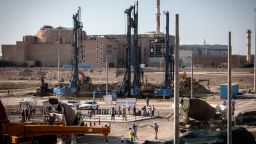Editor’s Note: Aaron David Miller is a senior fellow at the Carnegie Endowment for International Peace and author of “The End of Greatness: Why America Can’t Have (and Doesn’t Want) Another Great President.” Miller was a Middle East negotiator in Democratic and Republican administrations. The opinions expressed in this commentary are those of the author; view more opinion articles on CNN.
Indirect negotiations between the US and Iran have once again resumed in Vienna, in what is being described as a last-ditch effort to close an Iran nuclear deal.
Frustrated by the snail-like pace of the talks, the Biden administration has repeatedly imposed deadlines in the past. In July 2021, Secretary of State Antony Blinken warned talks “cannot go on indefinitely.” Later that year, National Security Adviser Jake Sullivan predicted the deadline for the Iran talks would come “within weeks.” Even President Joe Biden, who rarely weighs in on the negotiations, admitted last month that the US wouldn’t “wait forever” for Iran to respond to the US proposal.
And yet after a year and half, there is little to show for all these rounds of negotiations. So why not pull the plug? If Iran is stalling, or if the negotiations lead to a bad deal, what’s the purpose of continuing – especially if the regime is using this time to ramp up its nuclear program?
Before the Biden administration, and potentially its European partners, decide to call it quits, here are several factors to be considered.
First, however unlikely the chances of a successful negotiation, they’re not zero. Why preemptively take the US out of the game? We saw the results of such an approach in 2018 when the Trump administration unilaterally walked away from the 2015 Joint Comprehensive Plan of Action (JCPOA) and resorted to a campaign formally deemed as “maximum pressure.”
Iran found a way – at great cost to its own economy – to cope with economic sanctions, secure support from Russia and China and ramp up its nuclear program. According to the International Atomic Energy Agency (IAEA), Iran is now approaching the point where it has enough fissile material enriched to near weapons-grade for a nuclear weapon.
Some argue that maximum pressure was eroding Iran’s currency reserves, and had it continued it would have had an impact on Iran’s behavior in negotiations. Others claim former President Donald Trump’s approach lacked a compelling military option to instill fear in Tehran of being attacked.
But there’s no reason to believe that either of these pressure tactics – absent incentives – would fundamentally alter Iran’s calculations. Indeed, having spent decades involved in Middle East negotiations, I’ve yet to encounter one where a party gives up some fundamental interest or agrees to a deal through pressure alone.
Second, walking away from the negotiating table would impact America’s image and credibility. Negotiating with Iran is not just an effort to preempt a regional crisis due to Tehran’s unchecked nuclear ambitions – it’s also a political-diplomatic game of gotcha. In short, who takes the hit for ending the negotiations is part and parcel of any administration’s calculations.
At least one of Iran’s arguments – that the US can’t be trusted to maintain its commitments from one administration to another – is likely to be well received, especially if the US pulls out (again), this time from the negotiating table.
Nor is it by any means a certainty that much of the international community will side with Washington should it break off the negotiations. Indeed, as Russia’s invasion of Ukraine has demonstrated, the enthusiasm for sanctioning other countries is not widely shared by much of the world. Indeed, two-thirds of the world’s population live in countries that haven’t joined in sanctions against Russia.
Iran has deep ties to Russia and China – and key Gulf states, like the United Arab Emirates, already worried about their security in the event of a US-Iranian confrontation, are hedging their bets by enhancing their contacts with Iran.
Third, just because the 2015 Iran nuclear deal is no longer viable doesn’t mean that all diplomatic efforts need to come to an end. Admittedly any alternative to the 2015 deal faces perhaps even longer odds.
The administration thought it might embrace a “longer and stronger” accord that would have toughened up restrictions on Iran’s nuclear program. But just negotiating the original deal was an extraordinarily heavy lift, and it’s doubtful Iran would have agreed without much more for its side.
Others have envisioned an interim agreement, as a possible confidence-building measure – accepting some restrictions on Iran’s nuclear activities in exchange for the lifting of some sanctions.
It’s hard to imagine either of these working at the moment. But we could be nearing the end of all diplomatic efforts to deal with the Iran nuclear issue. And while Iran may be the roadblock now standing in the way of an agreement, the US should not be the party that is directly responsible for hanging a “closed for the season” sign on a diplomatic end game.
Four, the alternative to a flawed negotiating process is far worse. It would be nice to imagine that in the absence of any accord, everyone would behave in ways that would avoid a crisis. Through deterrence, risk aversion and common sense, Iran would keep its nuclear program below some red line – thus avoiding military action by Israel or the US.
But what is that red line? There’s zero trust and confidence between Iran and the West – and in the absence of the monitoring provisions contained in the original nuclear deal, the US and Israel would rightly assume the worst about Iran’s nuclear program. However imperfect JCPOA may have been, as an internationally recognized agreement that restricted Iran’s nuclear program, it gave those in Israel, Iran and the US, who see the dangers inherent in escalation, an argument still to pursue diplomacy. Without an accord of some kind, the field will be open to a range of non-diplomatic measures.
Invariably, the focus will turn, and already has to a certain extent, to a proverbial plan B – a mix of sanctions, political pressure and military deterrence. Only by persuading Iran that such an option exists and that the US will use it, the argument goes, can Iran’s nuclear program be deterred and can Iran be induced to negotiate in good faith.
Indeed, those who argue in favor of such an approach don’t necessarily recommend scuttling diplomacy. But it’s hard to imagine serious negotiations occurring in an environment of threats and pressure.
Get our free weekly newsletter
Now with Russia threatening a long war in Ukraine and China eyeing Taiwan amid rising Sino-US tensions, is that where the Biden administration wants to go? At best, even a successful military option against Iran’s nuclear sites would not guarantee an end to Iran’s nuclear program. It might even act as an incentive to reconstitute one at a faster pace – and with nuclear weapons as the goal.
To paraphrase former British Prime Minister Winston Churchill on democracy, when it comes to constraining Iran’s nuclear program, diplomacy is the worst of all options except for all the others. There’s no doubt that pressure of various kinds is critically important in any negotiation – and especially with Iran. But pressure alone will not work.
As frustrating as it may be, shutting the door on negotiations with Iran has few advantages, especially when International Crisis Group’s Iran Project Director Ali Vaez says the alternative may well be an “Iranian bomb or bombing Iran.”








